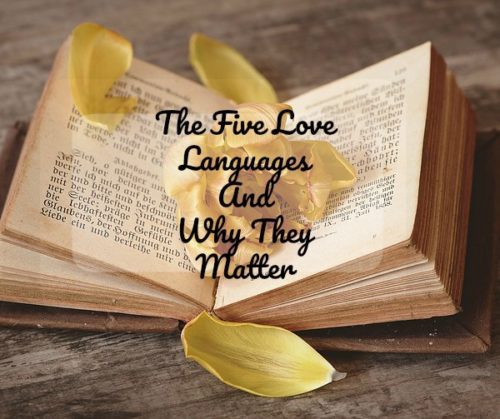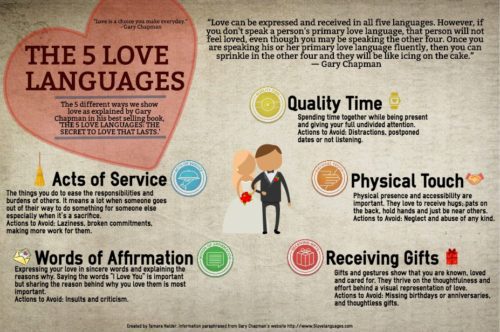As the new year began back in January, I examined myself to see if there were any goals I felt I needed to accomplish in the new year. As I thought about it, one came to mind. It was to be more intentional with my husband. My husband and I have a great relationship, but like any relationship, there is always room for growth and improvement. A lot of times we get busy with work and kids, and by the end of the day we are both spent.
How often do we take time to actually sit and just talk about us or goals we have or things that do not involve our kids? The truth is we rarely sit and have those talks. How could we change that or make that better? I had heard about the book, “The Five Love Languages,” by Gary Chapman, but had never actually read it. I had heard great things about it, so I approached my husband about reading it and he was on board. Reading this book together was an eye-opening experience for both of us. We learned a lot about ourselves individually and each other.

Do you and your spouse or significant other speak the same language? I am sure you would all say you do. How about the same love language? Do you show love to each other in the exact same way? Chances are, you probably do not.
Let me give you an example. To show my love to my husband, I will give him a hug at random, hold his hand, give him a gentle touch as he walks by, etc. But for him, while he does not mind those things at all, he shows his love for me in a different way. One of the most distinct ways is putting the laundry in and folding it. He will finish the dishes after supper, or take the kids outside to play so I can do things I need to do in the house. He will stop at the grocery store on his way home from work.
We discovered that we speak a different love language. We are both showing love to each other, but in a different way. I am more of a “physical touch” person while he is more of an “acts of service” person. It doesn’t mean that we do not show our love in other ways as well.
We discovered that we speak a different love language. We are both showing love to each other, but in a different way.
Just because you or your partner favor a particular love language, doesn’t mean you should stop expressing the other love languages. According to Chapman, even though we tend to favor one language more than the others, we still enjoy traits of the others as well. He shares that your emotional love language may be as different as Chinese from English. “No matter how hard you try to express love in English, if your spouse understands only Chinese, you will never understand how to love each other.” This was intriguing.
Chapman uses the analogy of a “Love Tank.” Understanding your spouse’s love language and acting accordingly will fill their “Love Tank”. The “Love Tank” analogy is a great metaphor for describing how loved someone feels. Like a gas tank in a car, our lives run best when our Love Tank is filled and constantly being topped off. With that being said, what are the five love languages?

The Five Love Languages
Words of Affirmation
The first love language is “words of affirmation”. If this is your love language this means constant encouragement by your spouse. These are essential ingredients in a relationship that is based on mutual trust and gratitude. If your spouse’s love language is words of affirmation, try to build him or her up as often and in as many ways as possible.
Quality Time
The second love language is “quality time.” This means doing something together where you give your spouse your full attention. One way Chapman suggests doing this is to establish a daily sharing time in which each of you will talk about three things that happened during the day and how you feel about them. It is basically sitting down with your spouse at the end of the day and connecting with them without distractions.
Receiving Gifts
The third love language is “receiving gifts.” If your spouse loves surprises, honor this by giving gifts of possessions or things you have created. Some spouses who speak this love language are most impressed with the gift of your physical presence. The important thing to remember about someone who speaks this language is that it is not the value of the gift, but the thought behind it.
Acts of Service
The fourth love language is “acts of service.” These expressions of love can range from doing little things around the house to taking responsibility for larger projects-tasks that require thought, planning, time, effort, and energy. Criticism and demands to do things tend to drive wedges. Spouses who speak this love language tend to have better outcomes by requesting instead of demanding. Chapman reminds us that actions speak louder than words.
Physical Touch
The fifth and final love language is “physical touch.” To this person, nothing speaks more deeply than appropriate touch. That doesn’t mean only in the bedroom — everyday physical connections, like kisses, hugs, backrubs, embracing, and holding hands are greatly appreciated. Any instance of physical abuse is a total deal breaker.. Even something as simple as sitting close to each other when watching your favorite television program can be something that can communicate your love loudly.

So how do I determine my love language?
Discovering your spouse’s primary love language is essential in order to keep their emotional love tank full. It is also important to know your own love language(s). Some people may have two love languages that speak to them. Chapman explains that two types of people will have difficulty in determining their primary love language. The first is the person whose emotional love tank has been full for a long time. The spouse of this person shows love in many different kinds of ways and so they are not certain which makes them feel most loved. The other kind of person who might have a hard time determining their love language is someone whose love tank feels empty. In order to determine your love language, Chapman suggests looking over your marriage and asking these questions.
- What does your spouse do or fail to do that hurts you most deeply? The opposite of what hurts you most is probably your love language.
- What have you most often requested of your spouse? The thing you have most often requested is likely the thing that would make you feel most loved.
- In what way do you regularly express love to your spouse? Your method of expressing love may be an indication that that would also make you feel loved.
In addition to these questions, there are also other ways to determine your love language. You can take this quiz that will help determine your love language by asking a series of questions to determine which love language you most identify with.
Resources:
If you would like study guides and other help as you read, Chapman offers some great resources. You can also order this book on Amazon. In addition to this book, Chapman also has written other books on the topic including the following: “A Teen’s Guide to the 5 Love Languages,”“Rising Above A Toxic Workplace: Taking Care of Yourself in an Unhealthy Environment,” “The Five Love Languages of Teenagers: The Secret to Loving Teenagers Effectively,” and “The Five Love Languages of Children: The Secret to Loving Children Effectively.”
How did it change us?
Reading this book did not change us, per se, but it made us more aware of each other’s personal need to feel love and what makes us feel that way. This book taught us about ourselves. It also made us more aware of how the other shows love most often. It taught us the other’s language and how we might learn to speak that more effectively. In all honesty, I also felt this book taught us how to love well. That means loving our spouse, our children, our family, and even our friends.
I feel this book brought us closer together because of what we learned about each other throughout our reading. It helped to answer questions for each of us as to why we do what we do. I highly recommend this book to all married couples. No matter if you have been married five years or 25 years, this book is a huge eye-opening experience to really delve into what makes us who we are.
“Love is a choice and love makes a difference.” ~Gary Chapman











“I feel this book brought us closer together because of what we learned about each other throughout our reading.” Absolutely. We found the discussion the reading generated was as useful as the teaching of the book